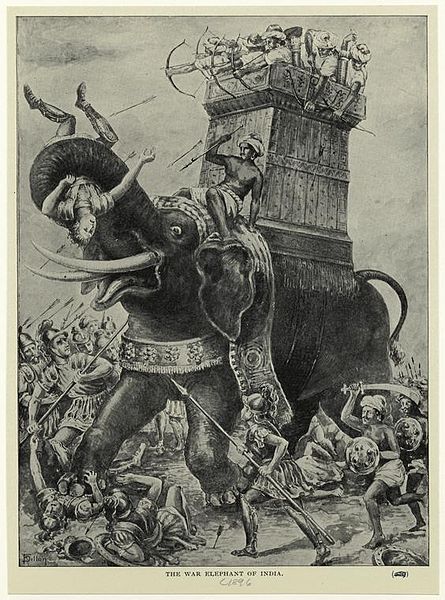MN 125 and MA 198 four jhanas simile and war elephant: how on earth does that resemble Ajahn Brahm and Vism. redefinition of "jhana"?
(This article is part of a series: 🔗MN 125 restoration project )
In MN 125 and MA 198 (agama parallel to MN 125), second through fourth jhana uses the simile of a war elephant training in imperturbability, like so:
Yato kho, aggivessana, āraññako nāgo hatthidamakassa uṭṭhānanisajjāya vacanakaro hoti ovādappaṭikaro, tamenaṃ hatthidamako uttari āneñjaṃ nāma kāraṇaṃ kāreti, mahantassa phalakaṃ soṇḍāya upanibandhati, tomarahattho ca puriso uparigīvāya nisinno hoti, samantato ca tomarahatthā purisā parivāretvā ṭhitā honti, hatthidamako ca dīghatomarayaṭṭhiṃ gahetvā purato ṭhito hoti. | When the wild elephant stands and sits when the trainer says, following instructions, the trainer sets the task called imperturbability. He fastens a large plank to its trunk; a lancer sits on its neck; other lancers surround it on all sides; and the trainer himself stands in front with a long lance. |
So āneñjaṃ kāraṇaṃ kāriyamāno neva purime pāde copeti na pacchime pāde copeti, na purimakāyaṃ copeti na pacchimakāyaṃ copeti, na sīsaṃ copeti, na kaṇṇe copeti, na dante copeti, na naṅguṭṭhaṃ copeti, na soṇḍaṃ copeti. | While practicing this task, it doesn’t budge its fore-feet or hind-feet, its fore-quarters or hind-quarters, its head, ears, tusks, tail, or trunk. |
How does (VRJ) Vism. redefinition of jhana even make sense here?
No one has commented yet, surprisingly, so I'm going to make a point of this. If Vism. and Ajahn Brahm redefinition of jhana were correct, how in the world does that war elephant imperturbable simile match a meditation state where one's sense of the body is completely gone, one can't feel mosquito bites, all one sees is a white nimitta?
Notice the war elephant jhana simile matches perfectly a correct EBT interpretation of the four jhanas. That one's mind is still connected to the body, one can hear sounds, one can feel mosquito bites, but one is imperturbable and undistractible, with the mind in singular focus, on a meditation topic that has predominance (over any other irrelevant or distracting input stimuli).
I will now perform a miracle
According to VRJ and Ajahn Brahm "Jhana" supporters such as B. Sujato, the Buddha had a limited vocabulary, and since jhana is such a wondrous mystical state defying words, the Buddha was forced to use confusing language and come up with similes that don't make sense.
I will now perform a miracle, and show that it is possible to make war elephant similes that DO in fact make sense, use plain English with no mystical mumbo jumbo that do in fact match what the VRJ and Ajahn redefinition of jhana feels like.
Simile:
The elephant trainer (the Buddha) then trains the elephant further.
He binds the legs of the elephant so it can't move.
He puts a white blindfold on the elephant so all it can see is white.
He puts ear plugs and nose plugs on the elephant so it can't hear or smell.
He rubs a special medicinal plant on the elephant's tongue so it can't taste.
He then shoots the elephant with a dart doped with a special medicinal herb so that the elephant's mind is conscious, but barely so, it no longer has any perception of time, just enough consciousness to know it's not dead and it's not asleep.
At a predetermined time, the elephant emerges from this stupor to regain normal consciousness.
There you go, I did what B. Sujato said was impossible, and what the Buddha could not do, make an elephant simile that matches what visuddhimagga and Ajahn Brahm claim the "real jhana" is.
So either I'm a greater miracle worker than the Buddha, or Vism. and Ajahn Brahm are mistaken about "real jhana."
Which is the more likely option?


Comments
Post a Comment